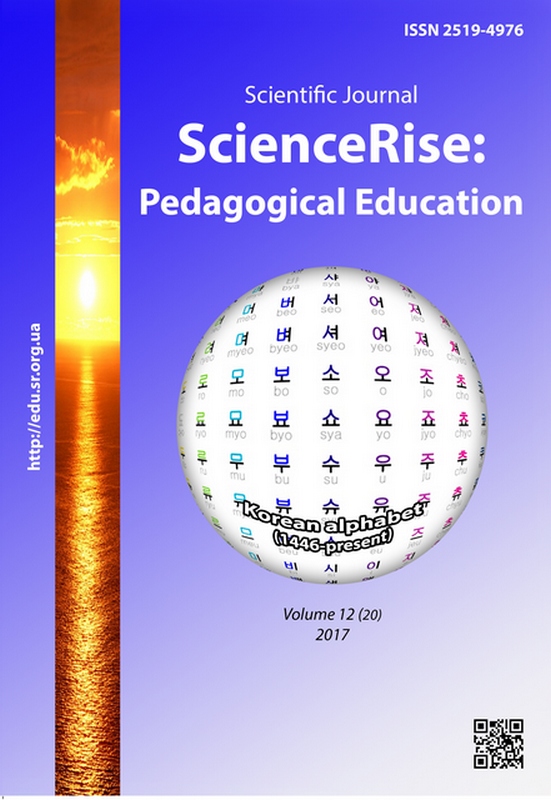Content-procedural aspects of experimental study of teenagers’ creativity development dynamics at integrated music lessons
DOI:
https://doi.org/10.15587/2519-4984.2017.118790Keywords:
creativity, creative competence, expert parameters, manifestations, integrated music lessonsAbstract
The study, devoted to the problem of creativity development of teen-age pupils in the process of the integrated music study, presents the substantiation of the fact that the solution of this problem by art is urgent for today. The paper analyzes the scientific literature about questions of the research, describes theoretical-methodological bases of the study of the creativity phenomenon, reveals the state of the problem of the creative development of a person of a teen-age pupil by art means, considers this problem by forming a creative competence, presented as a pedagogical connotation of the psychological phenomenon of teenagers’ creativity at integrated music lessons. The author of the paper gives his own definition of the notions “creativity” and “creative competence” of a teenager, determines expert parameters and criteria of the creative competence (associative-creative thinking, creative imagination, artistic power of observations, art-self-presentation), used at pupils’ diagnostication, manifestations and levels of the studied phenomenon formation. The author analyzes peculiarities of the content and process of the experimental work on studying the effectiveness of introducing the organization-methodical model of teenagers’ creativity development at integrated music lessons that includes the stages of teenagers’ creativity development (motivation-content, informative-cognitive, creative-praxiological, summary-resulting) and components of the pedagogical support of integrated music lessons that includes complied regularities and principles of art study, determined conditions, art methods and ways of teenagers’ creativity development, separated non-standard forms of integrated music lessons, modernized didactic means and pedagogical technologies of teenagers’ creativity development at integrated music lessons, into the educational process of secondary educational institutions. The paper describes the course of the consulting and summarizing stages of the experiment, analyzes their effectiveness. The author makes a conclusion about the fact that the effectiveness of creativity development in the structure of a personality of a pupil-teenager is conditioned by improving the content, forms and methods of the base education of school-children, directed on formation of highest human needs in creative self-representation. Creativity as a personal phenomenon is an important ability of teenagers to creative self-representation in the art-creative activity
References
- Dergavni osvitni standarty. Available at: http://iteach.com.ua/resources/full-time-tuition/m1/vp6/
- Onovleni programi dlya osnovnoi shkoly osvitnyoi galyzi “Mysteztvo” (2017–2018). Available at: https://artmon59-new.ed-era.com/
- Аntonova, О. E.; Dubaseniuk, O. A. (Ed.) (2012). Sytnist ponyattya kreatyvnosty: problem ta poshyki [The main thought of the phenomenon creativity: problems and searching]. Teoretychni i prykladni aspekty rozvitky kreatyvnoi osvity y vishiy shkoli. Zhitomir: GDY name of I. Franko, 14–41.
- Povyactel, N. I., Rozova, T. A. (2012). Praktychna psihologia creatyvnosti [The practical psychology of creativity]. Kyiv: NPU name of M. P. Dragomanova, 321.
- Ilyin, E. P. (2012). Psyhologia tvorchestva, kreatyvnosti, odaryonnosti [The psychology of creativity and talented personality]. Saint Petersburg: Piter, 830.
- Коzyr, А. V. (2016). Osnovny tendenzii rozvytky mystezkoi osvity na sychasnomy etapi [The development of the art education]. Profesionalizm pedahoha: teoretychni y metodychni aspekty, 3, 25–37.
- Segeda, N. A. (2014). Praksiologichni tendenzii rozvyazannya problem tvorchogo samoviragenya shcolyariv y svitovih myzichno-metodychnyh ideyah kinzya XX – pochatky XI stolyttia [Pracsiologycal appioaches in developing stydents’ creative self-presentation in the intynational musical ideas in XX –XI sentury]. Naukovyi visnyk Melitopolskoho derzhavnoho pedahohichnoho universytetu, 2 (11), 142–147.
- Segeda, N. A. (2011). Profesiyniy rozvitoc vicladacha myzichnogo mysteztva: istorya, metodologia, teoria [The professional development of the art tutor: history, mrtodology, theory]. Kyiv: NPU name of M. P. Dragomanova, 273.
- Raygorodskiy, D. Y. (2015). Enciklopedya psihological [The encyclopedia of psicological]. Moscow: Bahrah-M, 704.
- Nемоv, R. S. (2014). Psihologia [Psicology]. Moscow: Urait M, 639.
- Torshilova, E., Morozova, T. Diagnostics of the students’ estetical perception. Available at: https://talant-portal.sfedu.ru/content/diagnostiki-esteticheskogo-vospriyatiya-uchashchihsya
- Barysheva, T. A. (2016). Psihologia razvitiya kreativnosty: teoria, diagnostica, tehnologii [Psicology in developing creative: teoria, diagnostics, tehnology]. Saint Petersburg: VVM, 316.
- Anisimov, V. P. (2004). Diagnostica myzicalnih sposobnostey detey. Moscow: Vlados, 130. Available at: http://music-fantasy.ru/content/diagnostika-muzykalnyh-sposobnostey-detey
- Yznavanie figyr. Test. Available at: https://vsetesti.ru/321/
Downloads
Published
How to Cite
Issue
Section
License
Copyright (c) 2017 Svetlana Tereshchenko

This work is licensed under a Creative Commons Attribution 4.0 International License.
Our journal abides by the Creative Commons CC BY copyright rights and permissions for open access journals.
Authors, who are published in this journal, agree to the following conditions:
1. The authors reserve the right to authorship of the work and pass the first publication right of this work to the journal under the terms of a Creative Commons CC BY, which allows others to freely distribute the published research with the obligatory reference to the authors of the original work and the first publication of the work in this journal.
2. The authors have the right to conclude separate supplement agreements that relate to non-exclusive work distribution in the form in which it has been published by the journal (for example, to upload the work to the online storage of the journal or publish it as part of a monograph), provided that the reference to the first publication of the work in this journal is included.







